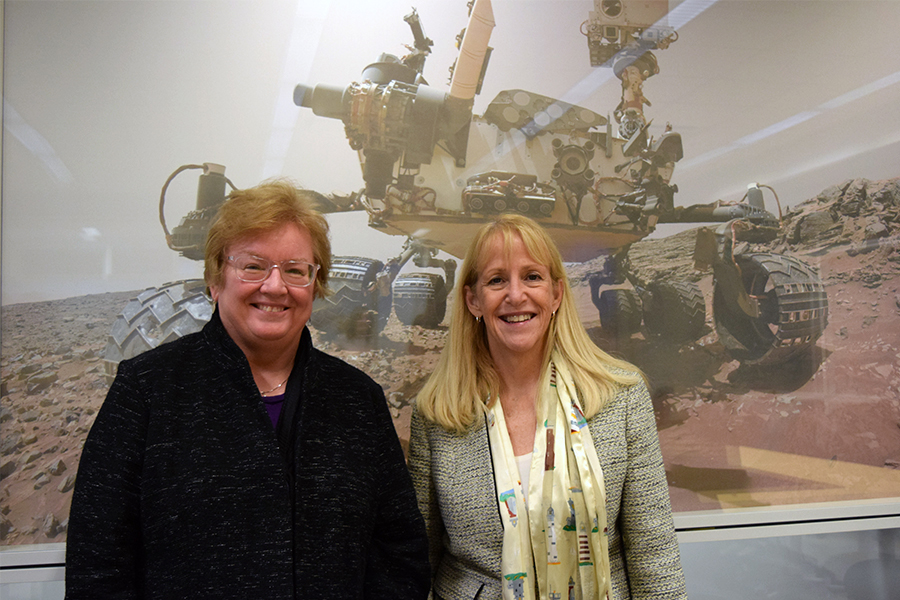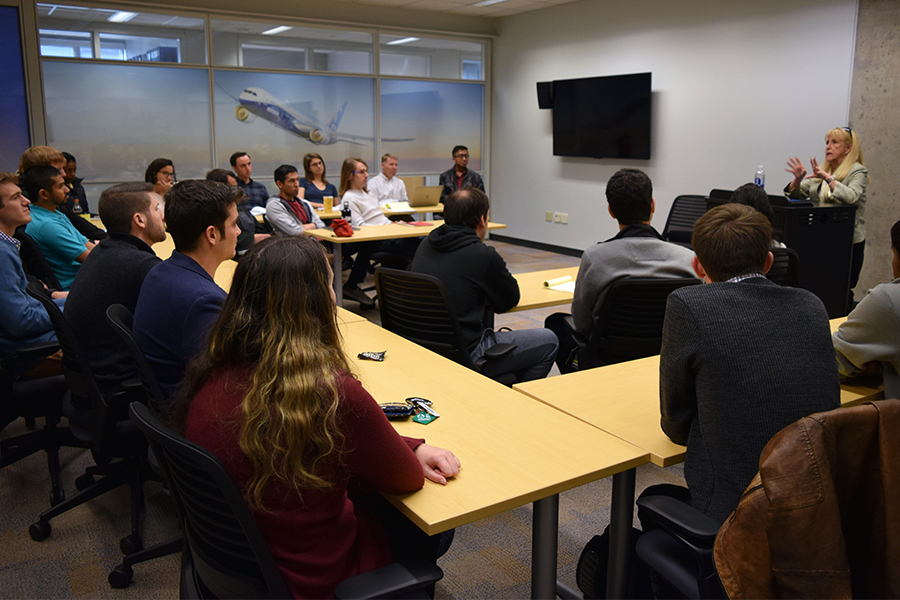Dittmar Selected As First Space Policy Fellow for Cislunar Initiative

To advance that effort, Purdue Engineering is collaborating with experts in the field, which is why Mary Lynne Dittmar has been selected as the first Space Policy Fellow of the Purdue Engineering Initiative in Cislunar Space.
As president and CEO of the Coalition for Deep Space Exploration (CDSE) and a member of the National Space Council Users’ Advisory Group, Dittmar is embedded within the world of space policy and intimately understands its facets. She was eager to share that knowledge and insight during a nearly weeklong visit to Purdue in November.
Dittmar lectured on space policy, engaged with students, and attended strategy sessions with senior university staff and faculty. She’ll return to campus in Spring 2020, when she likely will host a short course, among activities.
“One of the goals of the Cislunar Initiative is to be thinking about, ‘How do we bridge from policy to technology, and technology to policy?’ That’s actually kind of the trajectory of my career. I’ve done systems engineering and hardware up through policy,” Dittmar said. “I enjoy working with students. I enjoy helping to kick off research and development initiatives. It’s a good opportunity and a good moment in time to leverage my experience, Purdue’s membership in CDSE, and the interests of our industry partners with the Cislunar Initiative, as well as provide me the opportunity to get back in the classroom a little bit. So there’s a natural synergy.”
Years before the College of Engineering officially established its Cislunar Initiative, seeds were sown within the School of Aeronautics and Astronautics.
Daniel Dumbacher, a professor of engineering practice in AAE, was teaching courses in systems thinking, systems engineering and space policy. He brought in Dittmar as a guest lecturer in the latter area multiple times. During that time frame, Dumbacher and Dittmar had conversations about figuring out how to capitalize on the interest of companies focused beyond low-Earth orbit exploration with various Purdue departments. They wanted to take a multidisciplinary approach, grounded in but not limited to engineering.
Once Purdue became a member of the coalition and Dittmar had helped to expand the group to include nearly 70 members — from five founding members — she was spurred to produce change. NASA has a Cislunar Initiative, but Dittmar knew it needed to be reinforced.
Purdue was the ideal fit.

“No matter what the nature of the politics are and how the politics play out, what must absolutely underpin that is the technical, the extent to which technical and industry and academic interests all play together and can inform policy as it’s going forward. You have to have the other side of that iteration where policy sort of feeds back into all of that,” she said. “I do think Purdue is positioning itself, through the Cislunar Initiative and some of the other work it is doing on the defense side, as a network platform and an opportunity for those kinds of synergies. I think that’s absolutely, positively what’s needed right now.”
When Purdue Engineering launched the Cislunar Initiative in Summer 2019, Dittmar accepted a role on its advisory board. That led to her being named the first fellow for the initiative.
“Dr. Dittmar is uniquely positioned for this advocacy role with a strong technical background and, now, a deep understanding of space policy, particularly at the national level,” said Kathleen Howell, Hsu Lo Distinguished Professor of Aeronautics and Astronautics and co-chair of the Cislunar Initiative. “However, Dr. Dittmar is quick to comment that space policy occurs in other domains as well, for example, state government. There are also important international aspects. Although Purdue is well known for our depth in the technical disciplines as space exploration moves forward, the wealth of experience that Dr. Dittmar brings to our campus in the policy arena is an opportunity for our faculty and students.
“She also notes that Purdue is perhaps uniquely positioned to bring more technical information into the policy discussions. The future will be determined by our students. Thus, it seems prudent for them to be aware of and embrace the relationship between technical achievements — as well as challenges — and the policy directions to enable space development.”
In her initial meetings with students during her visit, Dittmar spoke candidly about those challenges, while also offering a thorough review of exactly what space policy is and what it entails. She spent a significant amount of time during two two-hour sessions answering specific questions from students, and many of those students left more informed and armed for action.
“Dr. Dittmar’s visit made me realize just how complex space policy is. From international treaties, trades and deals in Congress to the ‘Wild West,’ space policy is a really complex challenge to figure out,” said Emily Zimovan, one of Howell’s PhD students. “As an aerospace engineer, an understanding of space policy — what the current policies are and how these policies are made — wouId really help me to understand why and when changes happen and to navigate this industry and prepare me to influence future policies.”
